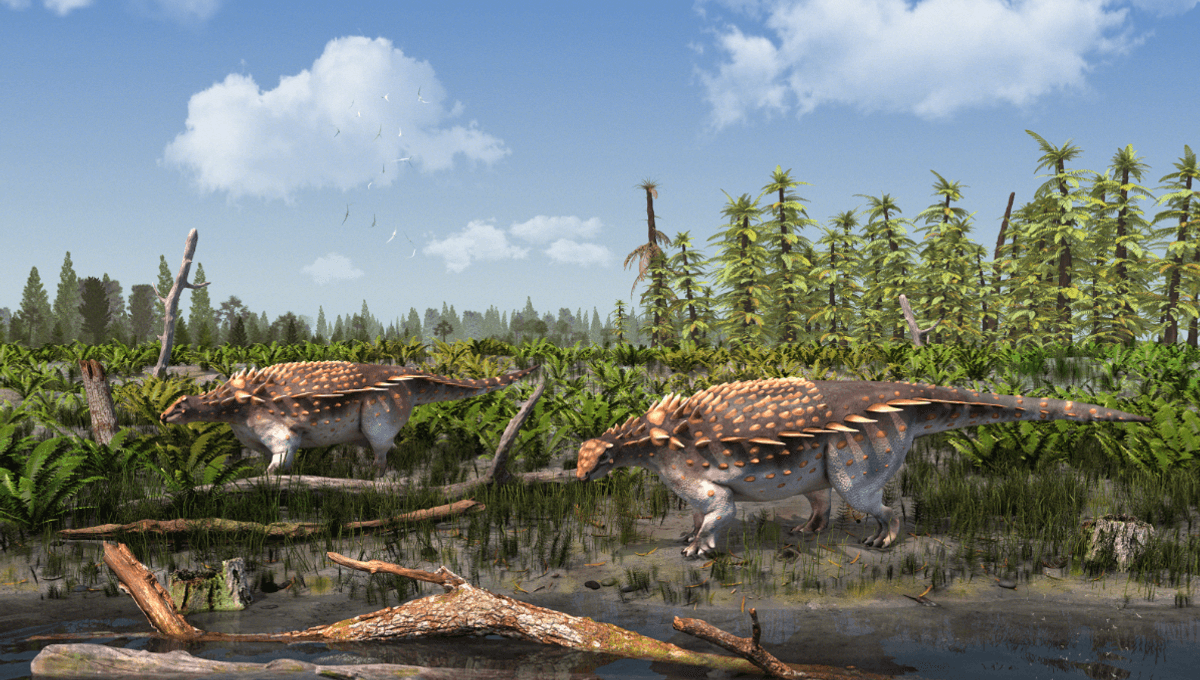
A new armored dinosaur, a species of ankylosaur, has been discovered on Britain’s famous dinosaur island, the Isle of Wight. It represents the first armored dinosaur from the island to be described in over 140 years.
The new tank-like dinosaur, Vectipelta barretti, was named in honor of Professor Paul Barrett of the Natural History Museum and was discovered in the Wessex formation on the Isle of Wight, off the south coast of England. This island, small as it is, has one of the richest fossil beds in the country and has been contributing important finds to palaeontology since the 19th century.
The Wessex Formation is a particularly famous fossil bed, part of the extensive Wealden Supergroup, which covers an immense time range from the beginning of the Cretaceous period onwards towards the early Aptian Stage. This fossil bed consists of alternating layers of clay and sand that were laid down between 140 and 125 million years ago.
The new discovery is extremely important for palaeontologists, lead author Stuart Pond explained in a statement, “because it sheds light on ankylosaur diversity within the Wessex formation and Early Cretaceous England.”
“For virtually 142 years, all ankylosaur remains from the Isle of Wight have been assigned to Polacanthus foxii, a famous dinosaur from the island, now all of those finds need to be revisited because we’ve described this new species.”
Vectipelta barretti differs from Polacanthus foxii in several key ways. The fossilized remains show differences in the animal’s neck and back vertebrae, along with a different pelvic structure and more blade-like spikes on its armour. Using phylogenetic analysis – which shows how species evolve through genetic changes – the team found that this new dino is not actually closely related to Polacanthus foxii at all. In fact, Vectipelta barretti appears to be more closely related to some Chinese ankylosaurs, which indicates that these dinosaurs roamed freely from Asia into Europe in the Early Cretaceous period.
Interestingly, fossils from the Early Cretaceous are quite rare across the world, which may suggest a mass extinction occurred at the end of the Jurassic period. If this is true, then the new tanky ankylosaur is an even more significant find as it sheds light on dinosaur diversity at the time and how life recovered.
When Vectipelta barretti was alive, the Isle of Wight would have been attached to the mainland and experienced a climate similar to the Mediterranean today. It was a prosperous flood plain with multiple large winding river systems. When these rivers flooded and receded again, the waters would have dragged all sorts of organic materials – plants, logs, and even dinosaurs – together to form isolated ponds left behind on the floodplain. Over time, the bits in this organic soup would have been buried in layers of sediment and clay, preserving them as fossils, which are still being recovered today.
On having the new dinosaur named after himself, Professor Barrett said, “I’m flattered and absolutely delighted to have been recognised in this way, not least as the first paper I ever wrote was also on an armoured dinosaur in the [Natural History Museum] collections. I’m sure that any physical resemblance is purely accidental.”
The team felt Professor Barrett deserved the recognition for decades of outstanding contributions to the field. “Myself and some of the other authors on this study have been mentored or supervised by Paul for most of our careers, and it was notable to us that Paul hadn’t had a dinosaur named after him yet,” senior author Dr Susannah Maidment said. “He’s hugely influential in vertebrate palaeontology, and he’s a world-leading authority on dinosaurs.”
The team are confident that more species of dinosaur will be found on the Isle of Wight in the future. “We have new iguanodontians that we are lining up, to be prepped and to be studied. I think we have at least two new taxa in the collections. With regards to ankylosaurs, they are somewhat rarer, so I think we need to keep our eyes peeled,” Dr Maidment concluded.
Vectipelta barretti will be on display at the Dinosaur Isle Museum on the Isle of Wight this summer. Its bones have been cleaned from the surrounding earth by museum staff and volunteers, which made the research possible.
The study is published in Journal of Systematic Palaeontology.
Source Link: New Tanky Dinosaur Found On The Isle Of Wight, Britain’s Dino Isle